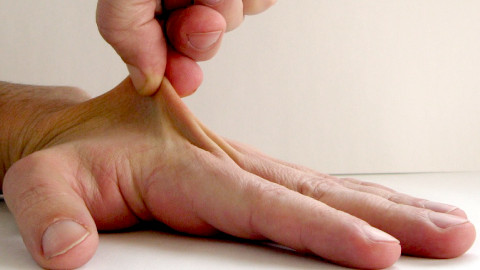Ehlers-Danlos Syndrome Related to Gastrointestinal Problems and Eating Disorders

Researchers at the UAB Department of Clinical Psychology and Health, in collaboration with the University of Paris and the University Hospital of Montpellier, recently published a study which for the first time points to a relation between gastrointestinal and eating disorders among women suffering from Ehlers-Danlos syndrome
30/04/2021
The research team at the Body Image Evaluation and Intervention Unit (UAIC) of the UAB Department of Clinical and Health Psychology, alongside researchers from the University of Paris and the University Hospital of Montpellier, reveal for the first time in a study the existence of a relation between gastrointestinal problems and eating disorders among women with Ehlers-Danlos syndrome, a genetic disease with several subtypes characterised mainly by a fragility in tissue, skin alterations and joint hypermobility.
The research was published in the journal Eating and Weight Disorders - Studies on Anorexia, Bulimia and Obesity, and will still produce more results thanks to the participation of more women in this study. For this reason, researchers invite women to participate in a short questionnaire, which will aid greatly in discovering more about Ehlers-Danlos syndrome and its relation with eating disorders.
The study of psychological and psychiatrical correlations to joint hypermobility is a line of research in which the UAB has been a leading actor. Already at the end of the 1980s, Professor Antonio Bulbena from the Department of Psychiatry and Legal Medicine pointed to the fact that this somatic trait was associated with anxiety in the prestigious Lancet journal. Currently, Professor Bulbena and French researchers are working together with the UAIC to continue to do research into this field.
At the base of Ehlers-Danlos syndrome lies an alteration of collagen synthesis, which can lead to problems mainly in the musculoskeletal system, although it can also extend to others such as the digestive system. Thus, the disease can produce temporomandibular, abdominal and dental pain, which may be frequent and can negatively affect a person’s diet.
The study compared the results of 66 women with Ehlers-Danlos and 39 women who did not suffer from this disease in a questionnaire which evaluates gastrointestinal symptoms such acidity, regurgitations, fullness, nausea, vomits, abdominal distension, abdominal pain and dysphagia, as well as food allergies and intolerances, eating disorders, a history of disorders and body mass index. The results of both groups were compared, as well as a multivariate analysis conducted to explore the associations between eating disorders, gastrointestinal symptoms and body mass index among the women in the Ehlers-Danlos syndrome group.
Gastrointestinal problems and eating disorders
The results reveal a high level of gastrointestinal problems and eating disorders among the women suffering from Ehlers-Danlos syndrome and, for the first time, point to an association between these two factors within this specific population.
The women with Ehlers-Danlos showed significantly more gastrointestinal symptoms and food allergies and intolerances, a greater history of these disorders, a higher risk of currently developing eating disorders and a lower body mass index than the women in the control group. The risk of eating disorders in women with the syndrome was associated with gastrointestinal symptoms; restrictions in eating were associated with gastrointestinal symptoms, food allergies and intolerances, and dysphagia; uncontrolled eating was associated with gastrointstinal symptoms; and the body mass index was associated with gastrointestinal symptoms and food allergies and intolerances.
Ongoing Study on Hypermobility and Diet
The Body Image Evaluation and Intervention Unit invites women of all physical conditions, 18 and older, and residing in Spain to participate in a study that analyses the relation between hypermobility and diet. The study consists in answering a questionnaire that can be found at the following link:
https://ceres.parisdescartes.fr/index.php/977923?lang=es
Original article:
Baeza-Velasco, C., Lorente, S., Tasa-Vinyals, E. et al. Gastrointestinal and eating problems in women with Ehlers–Danlos syndromes. Eat Weight Disorder (2021). https://doi.org/10.1007/s40519-021-01146-z
This information is related to the following SDG
Good health and well-being